An Analysis of Motivational Theories for Tesco Jack's Stores
VerifiedAdded on 2023/01/10
|8
|1516
|69
Report
AI Summary
This report delves into motivational theories relevant to Tesco Jack's discount stores, examining how these theories can enhance employee engagement and productivity. The report begins with an introduction to motivation, emphasizing its importance in achieving organizational goals. It then focuses on two key motivational techniques: Maslow's Hierarchy of Needs and Herzberg's Two-Factor Theory, detailing their application within the context of Tesco Jack's. The report provides a thorough explanation of each theory, outlining the various stages and factors involved, such as psychological needs, safety, social needs, esteem, self-actualization, hygiene factors, and motivators. Furthermore, it analyzes the advantages and disadvantages of each theory, offering insights into their practical implications and potential limitations. The report concludes by summarizing the significance of motivation in fostering a committed workforce and achieving organizational success, referencing relevant academic sources to support its findings.
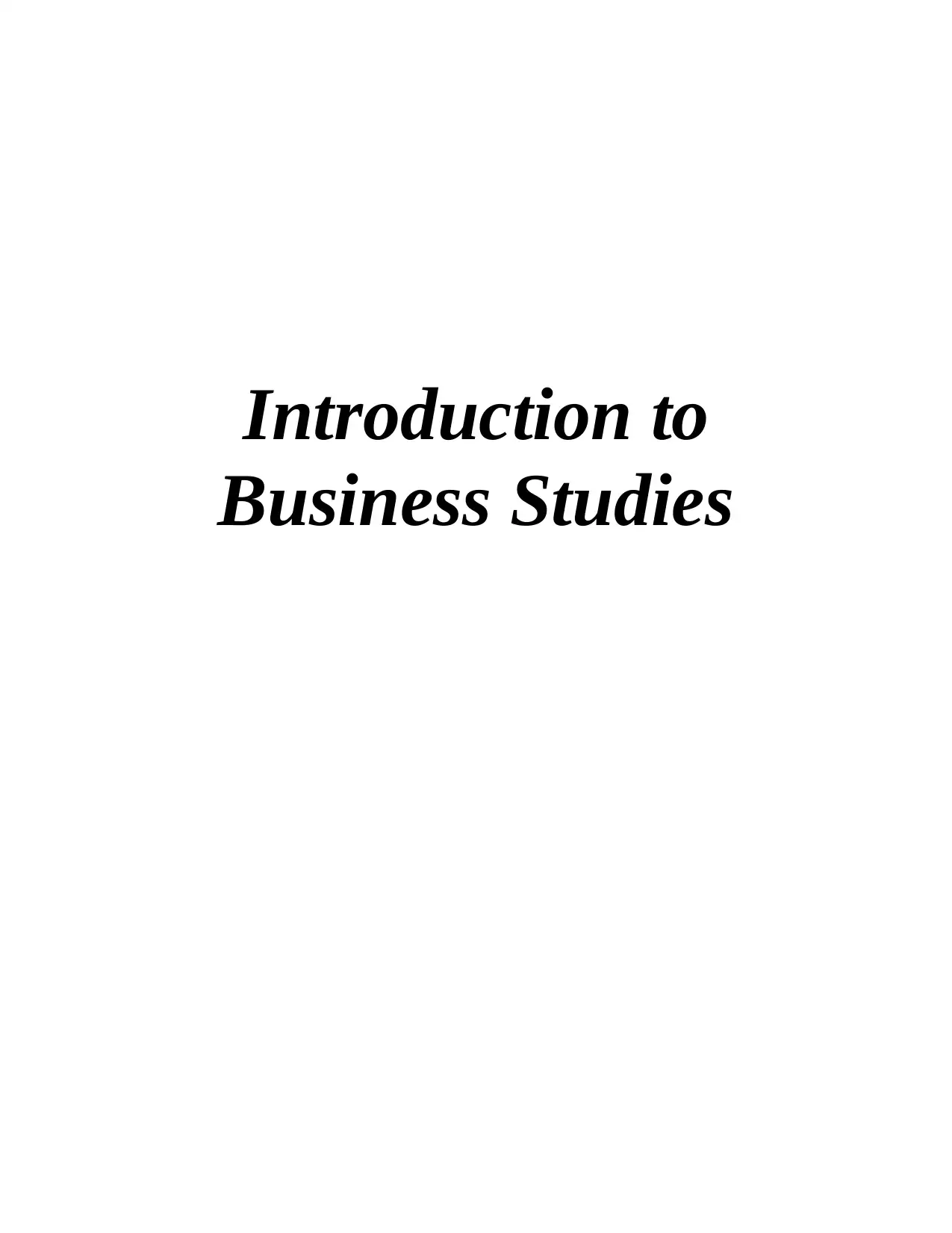
Introduction to
Business Studies
Business Studies
Paraphrase This Document
Need a fresh take? Get an instant paraphrase of this document with our AI Paraphraser
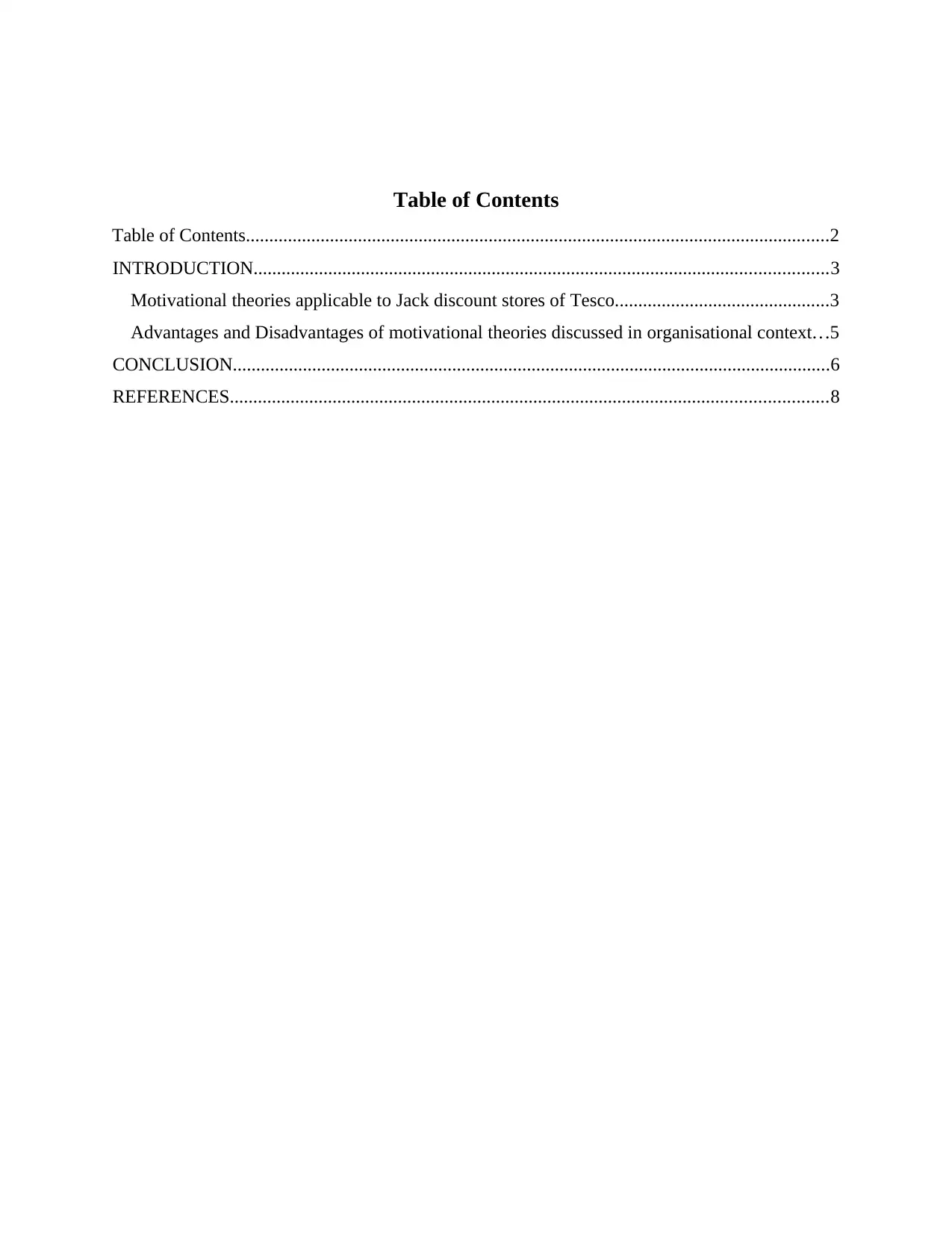
Table of Contents
Table of Contents.............................................................................................................................2
INTRODUCTION...........................................................................................................................3
Motivational theories applicable to Jack discount stores of Tesco..............................................3
Advantages and Disadvantages of motivational theories discussed in organisational context...5
CONCLUSION................................................................................................................................6
REFERENCES................................................................................................................................8
Table of Contents.............................................................................................................................2
INTRODUCTION...........................................................................................................................3
Motivational theories applicable to Jack discount stores of Tesco..............................................3
Advantages and Disadvantages of motivational theories discussed in organisational context...5
CONCLUSION................................................................................................................................6
REFERENCES................................................................................................................................8
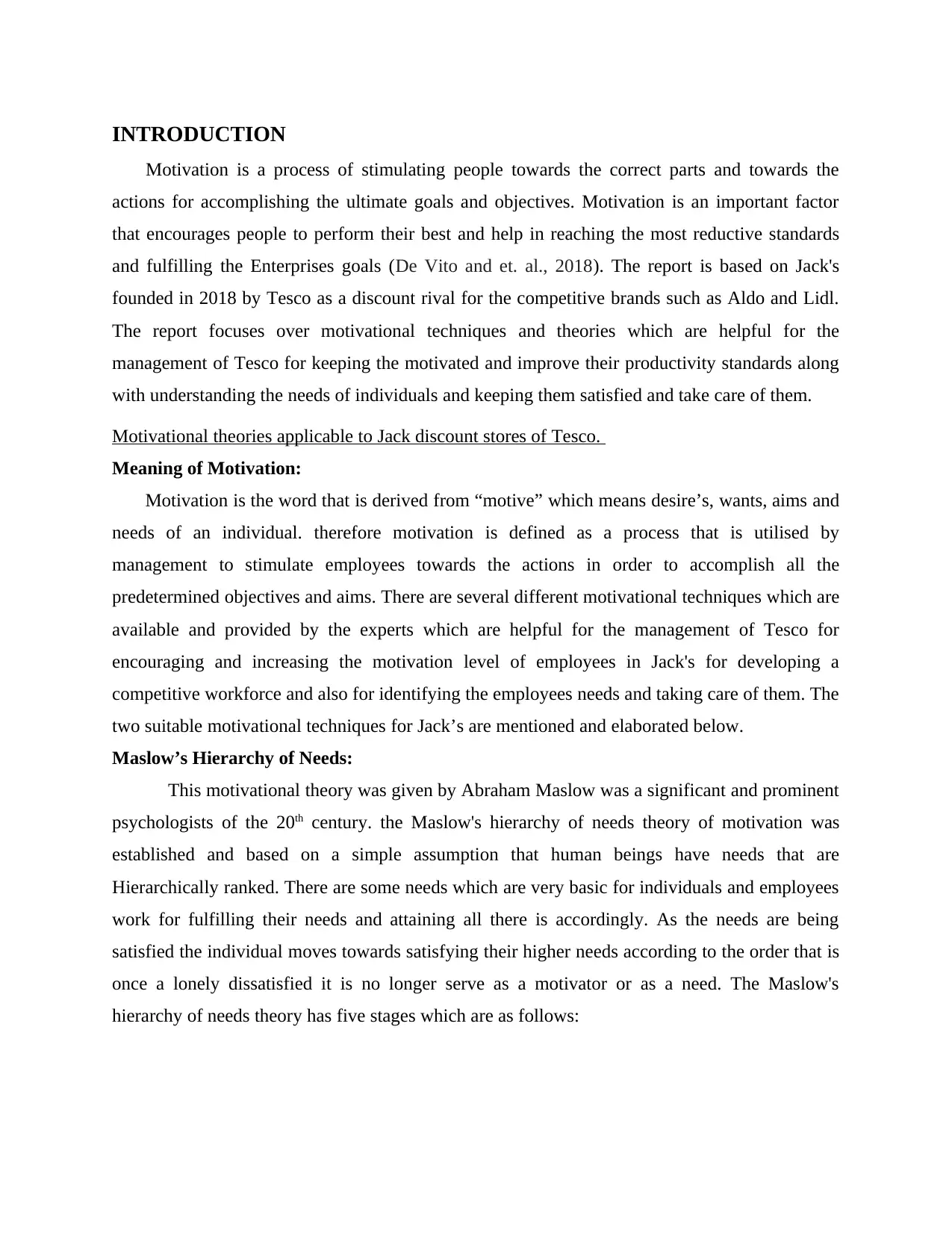
INTRODUCTION
Motivation is a process of stimulating people towards the correct parts and towards the
actions for accomplishing the ultimate goals and objectives. Motivation is an important factor
that encourages people to perform their best and help in reaching the most reductive standards
and fulfilling the Enterprises goals (De Vito and et. al., 2018). The report is based on Jack's
founded in 2018 by Tesco as a discount rival for the competitive brands such as Aldo and Lidl.
The report focuses over motivational techniques and theories which are helpful for the
management of Tesco for keeping the motivated and improve their productivity standards along
with understanding the needs of individuals and keeping them satisfied and take care of them.
Motivational theories applicable to Jack discount stores of Tesco.
Meaning of Motivation:
Motivation is the word that is derived from “motive” which means desire’s, wants, aims and
needs of an individual. therefore motivation is defined as a process that is utilised by
management to stimulate employees towards the actions in order to accomplish all the
predetermined objectives and aims. There are several different motivational techniques which are
available and provided by the experts which are helpful for the management of Tesco for
encouraging and increasing the motivation level of employees in Jack's for developing a
competitive workforce and also for identifying the employees needs and taking care of them. The
two suitable motivational techniques for Jack’s are mentioned and elaborated below.
Maslow’s Hierarchy of Needs:
This motivational theory was given by Abraham Maslow was a significant and prominent
psychologists of the 20th century. the Maslow's hierarchy of needs theory of motivation was
established and based on a simple assumption that human beings have needs that are
Hierarchically ranked. There are some needs which are very basic for individuals and employees
work for fulfilling their needs and attaining all there is accordingly. As the needs are being
satisfied the individual moves towards satisfying their higher needs according to the order that is
once a lonely dissatisfied it is no longer serve as a motivator or as a need. The Maslow's
hierarchy of needs theory has five stages which are as follows:
Motivation is a process of stimulating people towards the correct parts and towards the
actions for accomplishing the ultimate goals and objectives. Motivation is an important factor
that encourages people to perform their best and help in reaching the most reductive standards
and fulfilling the Enterprises goals (De Vito and et. al., 2018). The report is based on Jack's
founded in 2018 by Tesco as a discount rival for the competitive brands such as Aldo and Lidl.
The report focuses over motivational techniques and theories which are helpful for the
management of Tesco for keeping the motivated and improve their productivity standards along
with understanding the needs of individuals and keeping them satisfied and take care of them.
Motivational theories applicable to Jack discount stores of Tesco.
Meaning of Motivation:
Motivation is the word that is derived from “motive” which means desire’s, wants, aims and
needs of an individual. therefore motivation is defined as a process that is utilised by
management to stimulate employees towards the actions in order to accomplish all the
predetermined objectives and aims. There are several different motivational techniques which are
available and provided by the experts which are helpful for the management of Tesco for
encouraging and increasing the motivation level of employees in Jack's for developing a
competitive workforce and also for identifying the employees needs and taking care of them. The
two suitable motivational techniques for Jack’s are mentioned and elaborated below.
Maslow’s Hierarchy of Needs:
This motivational theory was given by Abraham Maslow was a significant and prominent
psychologists of the 20th century. the Maslow's hierarchy of needs theory of motivation was
established and based on a simple assumption that human beings have needs that are
Hierarchically ranked. There are some needs which are very basic for individuals and employees
work for fulfilling their needs and attaining all there is accordingly. As the needs are being
satisfied the individual moves towards satisfying their higher needs according to the order that is
once a lonely dissatisfied it is no longer serve as a motivator or as a need. The Maslow's
hierarchy of needs theory has five stages which are as follows:
⊘ This is a preview!⊘
Do you want full access?
Subscribe today to unlock all pages.

Trusted by 1+ million students worldwide
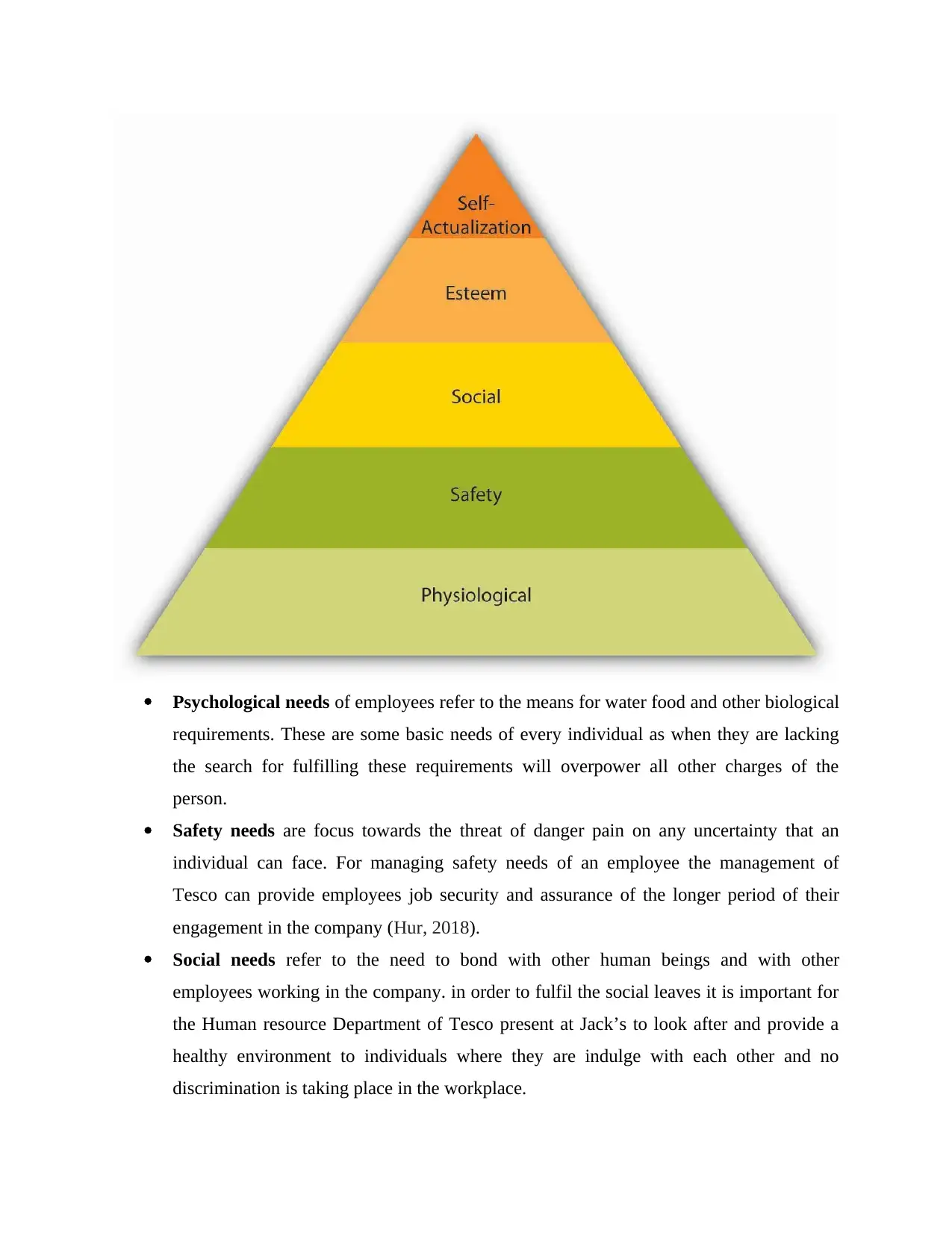
Psychological needs of employees refer to the means for water food and other biological
requirements. These are some basic needs of every individual as when they are lacking
the search for fulfilling these requirements will overpower all other charges of the
person.
Safety needs are focus towards the threat of danger pain on any uncertainty that an
individual can face. For managing safety needs of an employee the management of
Tesco can provide employees job security and assurance of the longer period of their
engagement in the company (Hur, 2018).
Social needs refer to the need to bond with other human beings and with other
employees working in the company. in order to fulfil the social leaves it is important for
the Human resource Department of Tesco present at Jack’s to look after and provide a
healthy environment to individuals where they are indulge with each other and no
discrimination is taking place in the workplace.
requirements. These are some basic needs of every individual as when they are lacking
the search for fulfilling these requirements will overpower all other charges of the
person.
Safety needs are focus towards the threat of danger pain on any uncertainty that an
individual can face. For managing safety needs of an employee the management of
Tesco can provide employees job security and assurance of the longer period of their
engagement in the company (Hur, 2018).
Social needs refer to the need to bond with other human beings and with other
employees working in the company. in order to fulfil the social leaves it is important for
the Human resource Department of Tesco present at Jack’s to look after and provide a
healthy environment to individuals where they are indulge with each other and no
discrimination is taking place in the workplace.
Paraphrase This Document
Need a fresh take? Get an instant paraphrase of this document with our AI Paraphraser
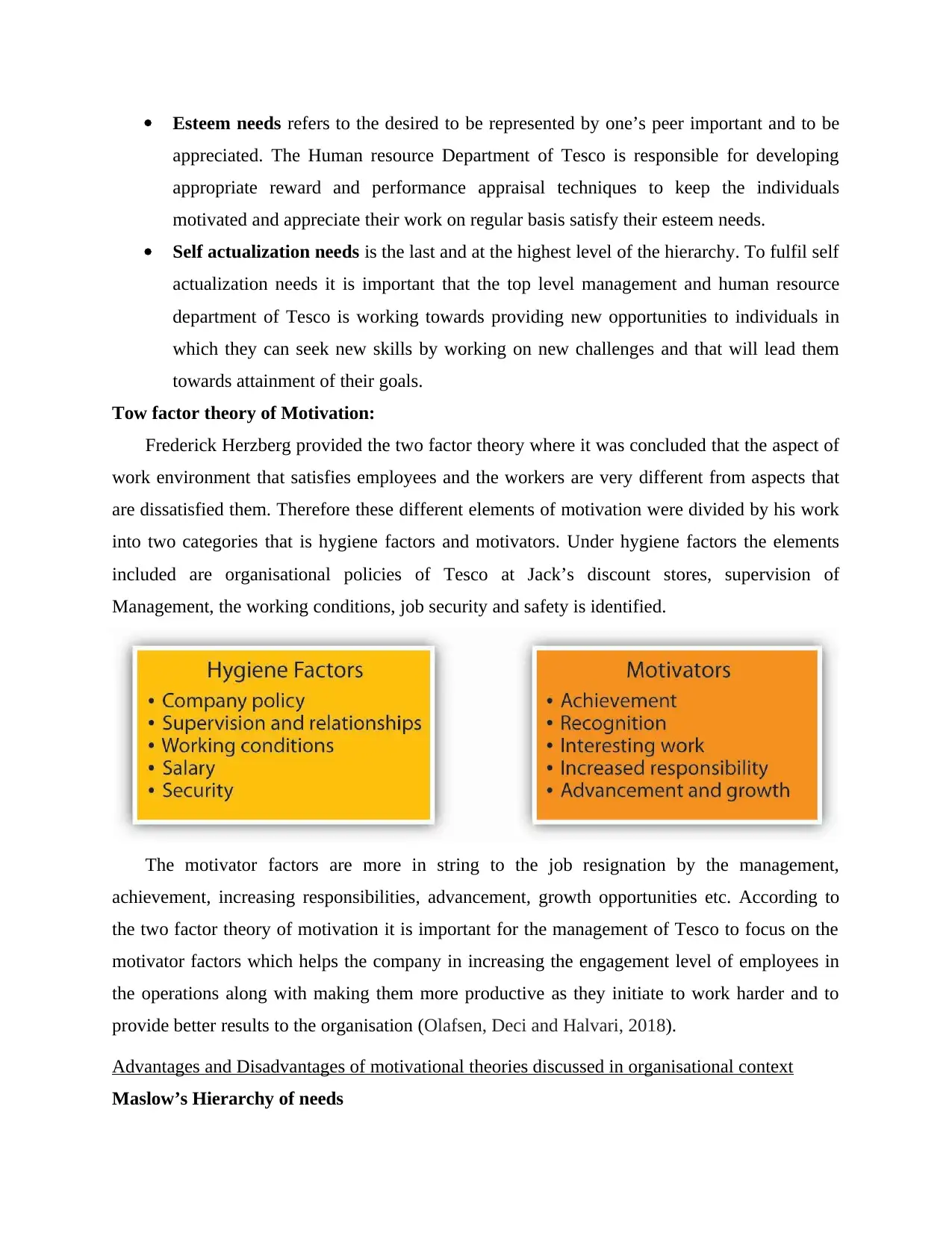
Esteem needs refers to the desired to be represented by one’s peer important and to be
appreciated. The Human resource Department of Tesco is responsible for developing
appropriate reward and performance appraisal techniques to keep the individuals
motivated and appreciate their work on regular basis satisfy their esteem needs.
Self actualization needs is the last and at the highest level of the hierarchy. To fulfil self
actualization needs it is important that the top level management and human resource
department of Tesco is working towards providing new opportunities to individuals in
which they can seek new skills by working on new challenges and that will lead them
towards attainment of their goals.
Tow factor theory of Motivation:
Frederick Herzberg provided the two factor theory where it was concluded that the aspect of
work environment that satisfies employees and the workers are very different from aspects that
are dissatisfied them. Therefore these different elements of motivation were divided by his work
into two categories that is hygiene factors and motivators. Under hygiene factors the elements
included are organisational policies of Tesco at Jack’s discount stores, supervision of
Management, the working conditions, job security and safety is identified.
The motivator factors are more in string to the job resignation by the management,
achievement, increasing responsibilities, advancement, growth opportunities etc. According to
the two factor theory of motivation it is important for the management of Tesco to focus on the
motivator factors which helps the company in increasing the engagement level of employees in
the operations along with making them more productive as they initiate to work harder and to
provide better results to the organisation (Olafsen, Deci and Halvari, 2018).
Advantages and Disadvantages of motivational theories discussed in organisational context
Maslow’s Hierarchy of needs
appreciated. The Human resource Department of Tesco is responsible for developing
appropriate reward and performance appraisal techniques to keep the individuals
motivated and appreciate their work on regular basis satisfy their esteem needs.
Self actualization needs is the last and at the highest level of the hierarchy. To fulfil self
actualization needs it is important that the top level management and human resource
department of Tesco is working towards providing new opportunities to individuals in
which they can seek new skills by working on new challenges and that will lead them
towards attainment of their goals.
Tow factor theory of Motivation:
Frederick Herzberg provided the two factor theory where it was concluded that the aspect of
work environment that satisfies employees and the workers are very different from aspects that
are dissatisfied them. Therefore these different elements of motivation were divided by his work
into two categories that is hygiene factors and motivators. Under hygiene factors the elements
included are organisational policies of Tesco at Jack’s discount stores, supervision of
Management, the working conditions, job security and safety is identified.
The motivator factors are more in string to the job resignation by the management,
achievement, increasing responsibilities, advancement, growth opportunities etc. According to
the two factor theory of motivation it is important for the management of Tesco to focus on the
motivator factors which helps the company in increasing the engagement level of employees in
the operations along with making them more productive as they initiate to work harder and to
provide better results to the organisation (Olafsen, Deci and Halvari, 2018).
Advantages and Disadvantages of motivational theories discussed in organisational context
Maslow’s Hierarchy of needs
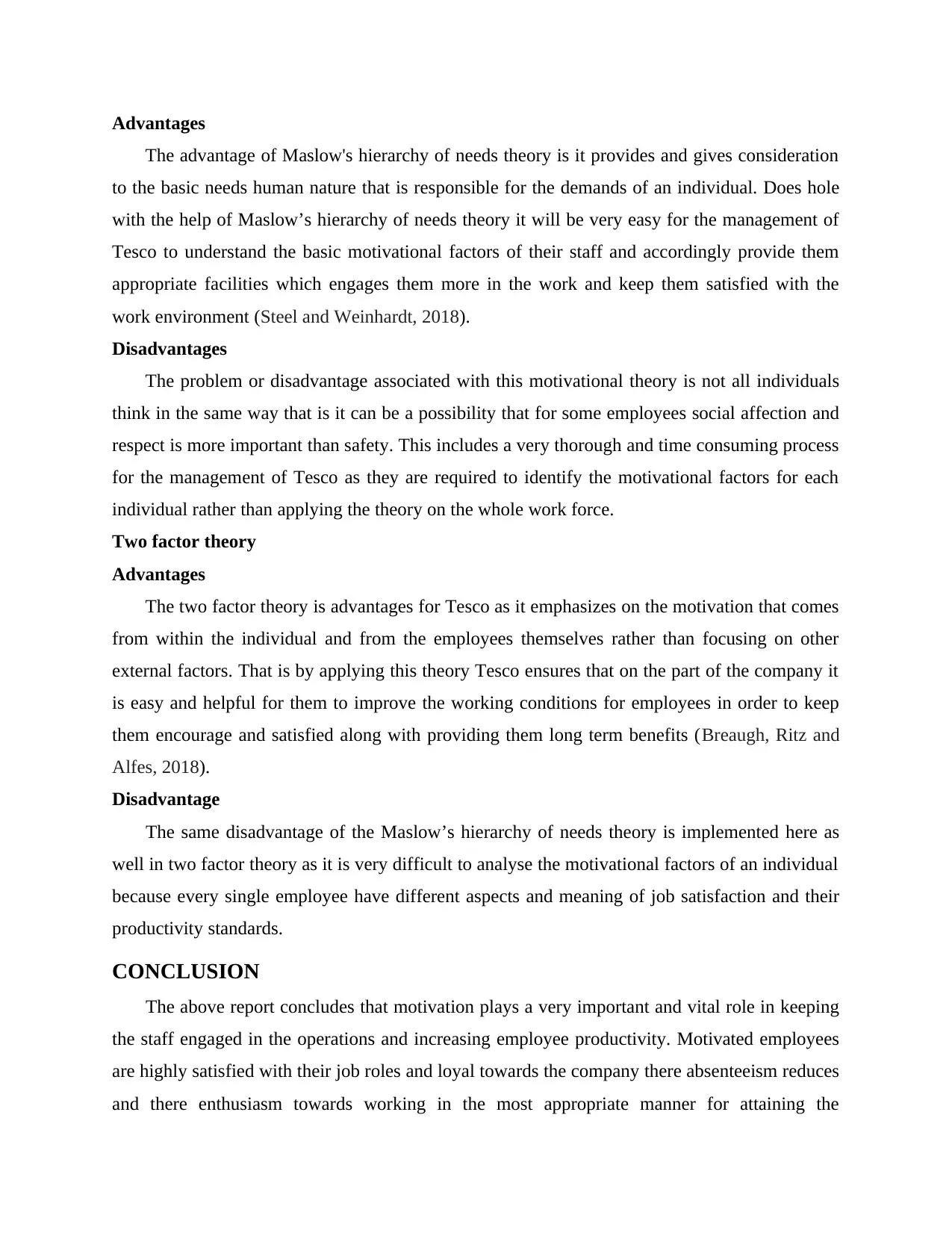
Advantages
The advantage of Maslow's hierarchy of needs theory is it provides and gives consideration
to the basic needs human nature that is responsible for the demands of an individual. Does hole
with the help of Maslow’s hierarchy of needs theory it will be very easy for the management of
Tesco to understand the basic motivational factors of their staff and accordingly provide them
appropriate facilities which engages them more in the work and keep them satisfied with the
work environment (Steel and Weinhardt, 2018).
Disadvantages
The problem or disadvantage associated with this motivational theory is not all individuals
think in the same way that is it can be a possibility that for some employees social affection and
respect is more important than safety. This includes a very thorough and time consuming process
for the management of Tesco as they are required to identify the motivational factors for each
individual rather than applying the theory on the whole work force.
Two factor theory
Advantages
The two factor theory is advantages for Tesco as it emphasizes on the motivation that comes
from within the individual and from the employees themselves rather than focusing on other
external factors. That is by applying this theory Tesco ensures that on the part of the company it
is easy and helpful for them to improve the working conditions for employees in order to keep
them encourage and satisfied along with providing them long term benefits (Breaugh, Ritz and
Alfes, 2018).
Disadvantage
The same disadvantage of the Maslow’s hierarchy of needs theory is implemented here as
well in two factor theory as it is very difficult to analyse the motivational factors of an individual
because every single employee have different aspects and meaning of job satisfaction and their
productivity standards.
CONCLUSION
The above report concludes that motivation plays a very important and vital role in keeping
the staff engaged in the operations and increasing employee productivity. Motivated employees
are highly satisfied with their job roles and loyal towards the company there absenteeism reduces
and there enthusiasm towards working in the most appropriate manner for attaining the
The advantage of Maslow's hierarchy of needs theory is it provides and gives consideration
to the basic needs human nature that is responsible for the demands of an individual. Does hole
with the help of Maslow’s hierarchy of needs theory it will be very easy for the management of
Tesco to understand the basic motivational factors of their staff and accordingly provide them
appropriate facilities which engages them more in the work and keep them satisfied with the
work environment (Steel and Weinhardt, 2018).
Disadvantages
The problem or disadvantage associated with this motivational theory is not all individuals
think in the same way that is it can be a possibility that for some employees social affection and
respect is more important than safety. This includes a very thorough and time consuming process
for the management of Tesco as they are required to identify the motivational factors for each
individual rather than applying the theory on the whole work force.
Two factor theory
Advantages
The two factor theory is advantages for Tesco as it emphasizes on the motivation that comes
from within the individual and from the employees themselves rather than focusing on other
external factors. That is by applying this theory Tesco ensures that on the part of the company it
is easy and helpful for them to improve the working conditions for employees in order to keep
them encourage and satisfied along with providing them long term benefits (Breaugh, Ritz and
Alfes, 2018).
Disadvantage
The same disadvantage of the Maslow’s hierarchy of needs theory is implemented here as
well in two factor theory as it is very difficult to analyse the motivational factors of an individual
because every single employee have different aspects and meaning of job satisfaction and their
productivity standards.
CONCLUSION
The above report concludes that motivation plays a very important and vital role in keeping
the staff engaged in the operations and increasing employee productivity. Motivated employees
are highly satisfied with their job roles and loyal towards the company there absenteeism reduces
and there enthusiasm towards working in the most appropriate manner for attaining the
⊘ This is a preview!⊘
Do you want full access?
Subscribe today to unlock all pages.

Trusted by 1+ million students worldwide
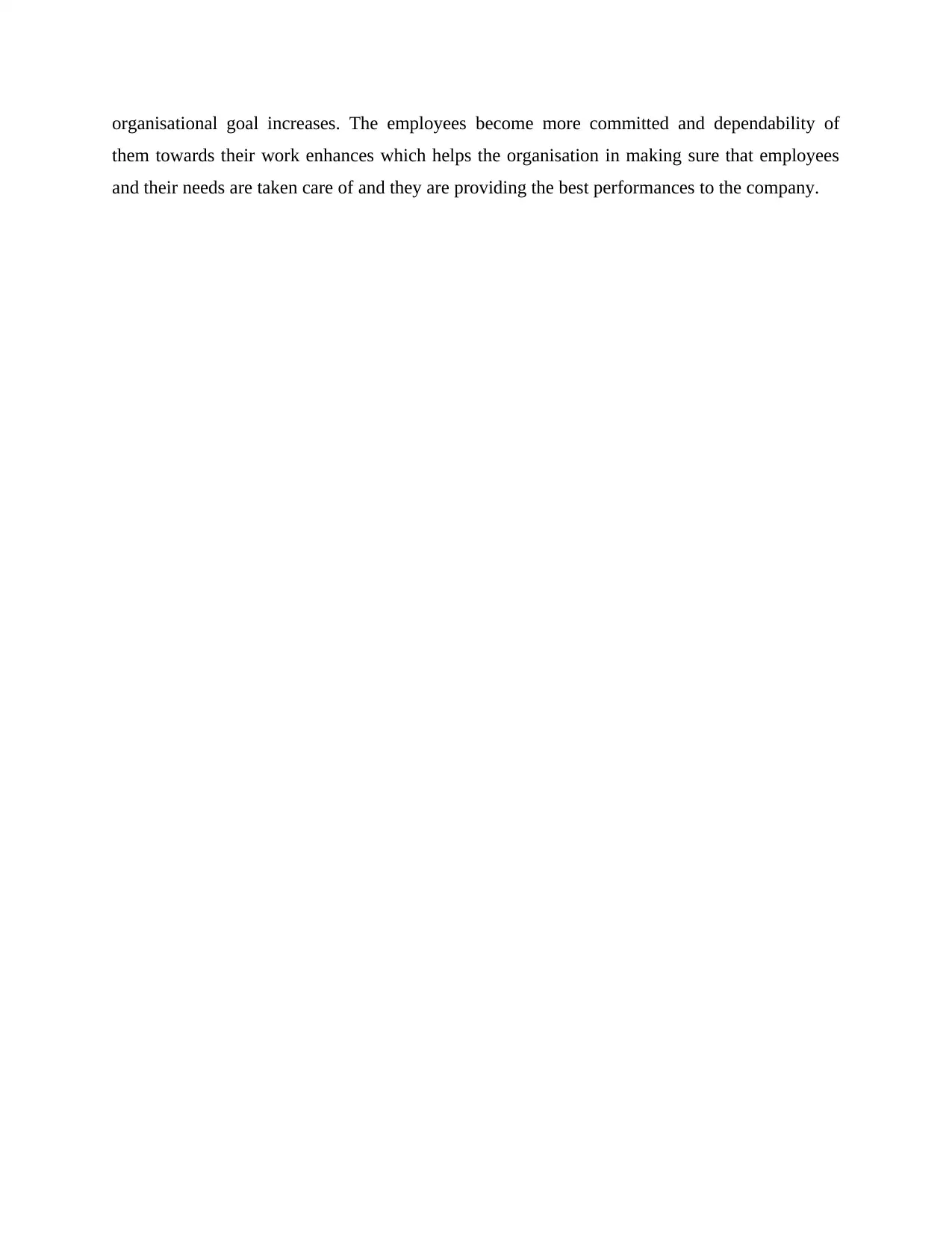
organisational goal increases. The employees become more committed and dependability of
them towards their work enhances which helps the organisation in making sure that employees
and their needs are taken care of and they are providing the best performances to the company.
them towards their work enhances which helps the organisation in making sure that employees
and their needs are taken care of and they are providing the best performances to the company.
Paraphrase This Document
Need a fresh take? Get an instant paraphrase of this document with our AI Paraphraser
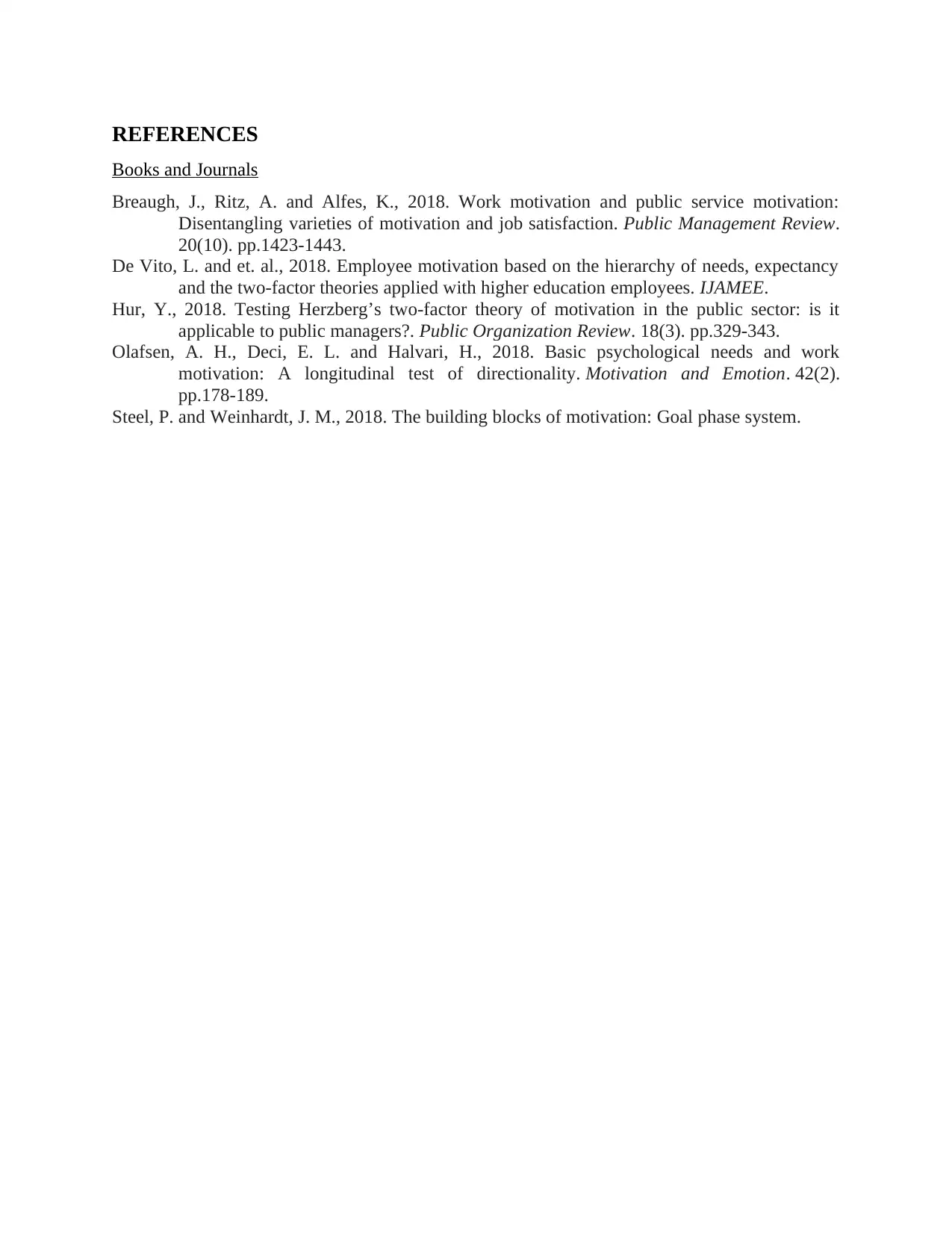
REFERENCES
Books and Journals
Breaugh, J., Ritz, A. and Alfes, K., 2018. Work motivation and public service motivation:
Disentangling varieties of motivation and job satisfaction. Public Management Review.
20(10). pp.1423-1443.
De Vito, L. and et. al., 2018. Employee motivation based on the hierarchy of needs, expectancy
and the two-factor theories applied with higher education employees. IJAMEE.
Hur, Y., 2018. Testing Herzberg’s two-factor theory of motivation in the public sector: is it
applicable to public managers?. Public Organization Review. 18(3). pp.329-343.
Olafsen, A. H., Deci, E. L. and Halvari, H., 2018. Basic psychological needs and work
motivation: A longitudinal test of directionality. Motivation and Emotion. 42(2).
pp.178-189.
Steel, P. and Weinhardt, J. M., 2018. The building blocks of motivation: Goal phase system.
Books and Journals
Breaugh, J., Ritz, A. and Alfes, K., 2018. Work motivation and public service motivation:
Disentangling varieties of motivation and job satisfaction. Public Management Review.
20(10). pp.1423-1443.
De Vito, L. and et. al., 2018. Employee motivation based on the hierarchy of needs, expectancy
and the two-factor theories applied with higher education employees. IJAMEE.
Hur, Y., 2018. Testing Herzberg’s two-factor theory of motivation in the public sector: is it
applicable to public managers?. Public Organization Review. 18(3). pp.329-343.
Olafsen, A. H., Deci, E. L. and Halvari, H., 2018. Basic psychological needs and work
motivation: A longitudinal test of directionality. Motivation and Emotion. 42(2).
pp.178-189.
Steel, P. and Weinhardt, J. M., 2018. The building blocks of motivation: Goal phase system.
1 out of 8
Related Documents
Your All-in-One AI-Powered Toolkit for Academic Success.
+13062052269
info@desklib.com
Available 24*7 on WhatsApp / Email
![[object Object]](/_next/static/media/star-bottom.7253800d.svg)
Unlock your academic potential
Copyright © 2020–2026 A2Z Services. All Rights Reserved. Developed and managed by ZUCOL.





